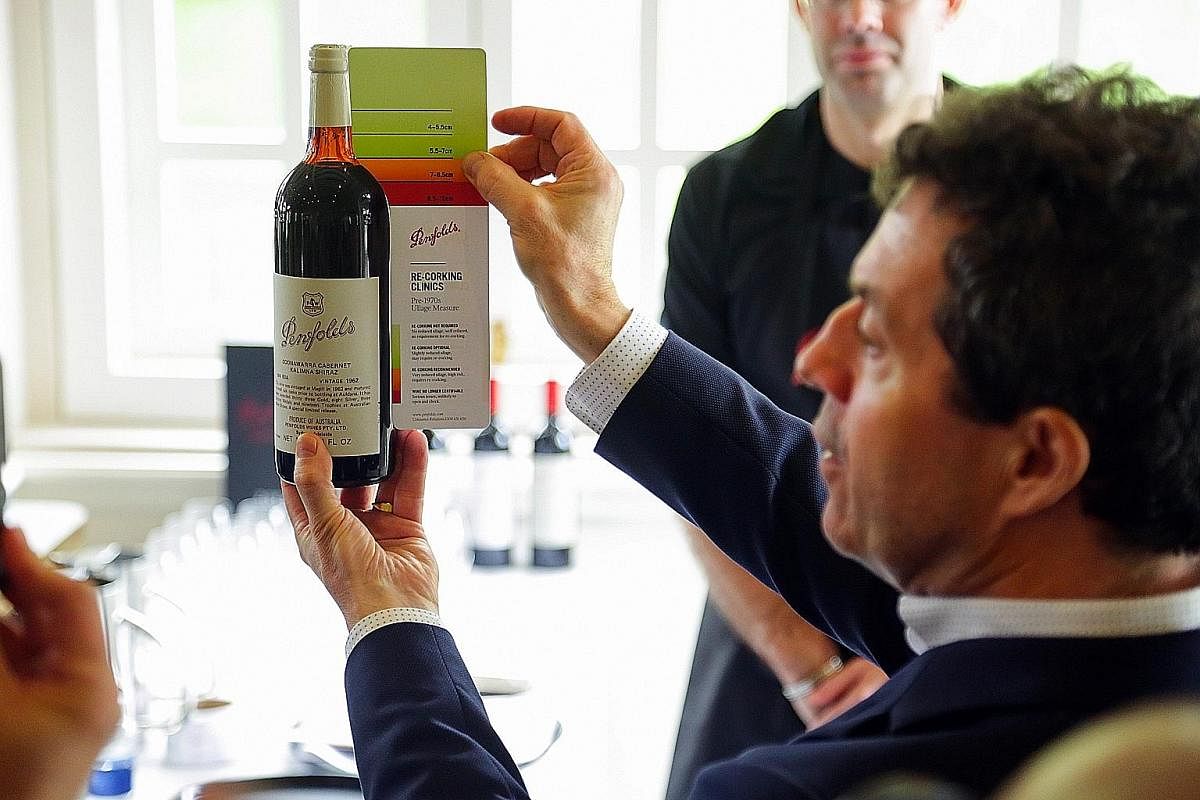Swig
The wine doctor is in
Penfolds chief winemaker Peter Gago conducts health checks on reds at recorking clinics

At a Penfolds Recorking Clinic, the Australian wine estate's chief winemaker Peter Gago serves as a wine doctor of sorts, performing a health check-up on precious reds.
Through his clinic, he and his team of winemakers help determine whether a wine is an acceptable example of that particular Penfolds brand or vintage. He can even assess if it is good to drink, if it can age further or if it has gone bad.
"A lot of people think these are Grange clinics," says Mr Gago, referring to Penfolds' most prized range of "first-growth" wines that are considered extremely collectible.
"But they're not. You can bring in any Penfolds red wine, as long as it's 15 years or older - even the Koonunga Hill or Bin 28," he adds, referring to the lower-end range of Penfolds reds.
Though they may be cheaper, their wines have ageing potential at every level and can be cellared as well, he says.
The 60-year-old would know. He has been with the company for 28 years, over which time he has developed an expert wine-tasting palate.
Armed with instruments such as a card that tells you if the level of the liquid is too far down the bottle and a two-pronged opener called a "butler's thief", Mr Gago sniffs, swirls and tastes the wine before determining if it is up to scratch.
"When a bottle comes in, it doesn't have to be the world's best example, but it's got to be above a certain point of acceptance," he says.
"I'm tasting the wine all the time, so I know what to look for."
If it is good to go, the bottle is topped up with the current vintage of a similar wine, recorked and recapsuled on the spot with a machine that his team travels with. A signed, white label is stuck on the back of the bottle. This certification is also recorded in the Penfolds archive.
The recorking clinics, which are free, have been running for the past 26 years, with well over 140,000 bottles assessed. They take place all over the world in markets where Penfolds is popular, such as Hong Kong, New York and Sydney.
The Singapore edition of the clinic, the second since 2013, took place last month at Capella Singapore. One hundred and eighty-five bottles were assessed, with more than 60 per cent of them recorked.
Not all bottles pass the Penfolds team's exacting standards, however, and such bottles get a white dot sticker to signify that they have been assessed, but did not pass the test. These bottles will get recorked with a plain, non-Penfolds branded cork, but without a capsule or certificate.
"But people leave here happy with white dots because, in effect, we've given them permission to drink their wines now, this week or within the next year," he says.
If the bottle passes his quality test, it could go up in value. For instance, a 1962 Bin 60A was opened in front of the media in Singapore on Nov 14. The bottle, which was opened, checked and certified by Mr Gago himself, is now estimated to be about $11,000. Non-certified bottles of that vintage and brand cost $8,000 to $9,000,
"If there's an ulterior motive at these clinics, it's to take bad wines out of the system to improve the gene pool," says Mr Gago.
"So when things are sold in the secondary market, people will know that everything is as it should be."
But ultimately, he says, "every bottle is a story".
"Nowadays, wine isn't just for the chosen few or the cognoscenti - wine is what we all do. These clinics are about appreciating wine as it matures."
Among the Singaporeans who wanted their wine assessed was marketing director Vanessa Frida.
Ms Frida, who is in her late 30s, had a bottle of 1998 St Henri that she paid $128 for with her first pay cheque from her first job in 2001.
"I bought two bottles - one to keep for myself and the other to give to my parents as thanks for putting me through school," she says.
"I tasted the 1998 at a family friend's home and I remember it being really tasty, so when I graduated, I decided to get the same bottle because I was guaranteed it was good."
After storing it in her temperature-controlled wine fridge for 16 years, she took the bottle to the recorking clinic, where Mr Gago determined the cork and wine were in "perfect condition" and the bottle did not need to be recorked.
That said, the bottle was opened and Ms Frida got to have a taste of the wine before it was topped up and recorked for further ageing.
"He said it's ready to be drunk any time in the next 10 years, but I think I will keep it for my 10th wedding anniversary since I just got married this year," she says.
Join ST's Telegram channel and get the latest breaking news delivered to you.
A version of this article appeared in the print edition of The Sunday Times on December 03, 2017, with the headline The wine doctor is in. Subscribe

